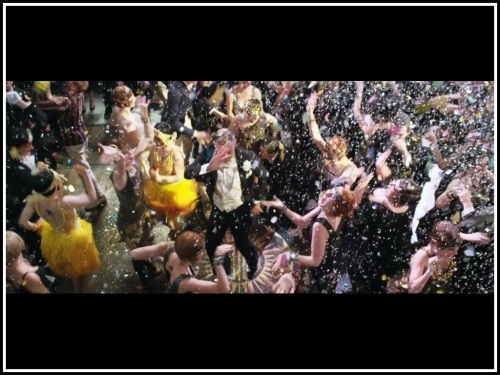To begin with, I love Fitzgerald’s The Great Gatsby. I taught the novel for many years but I never grew tired of reading it. So, as I sat down to watch Baz Luhrmann’s The Great Gatsby, I expected to like the movie – his Romeo + Juliet is one of my favorite movies – but I wasn’t sure how anyone could capture the novel on film. It’s too poetic, too tragic, and too challenging (Is Jay Gatsby really a hero? Is the American Dream really an illusion, a carrot to make us good little worker bees?). I was happily mistaken. I think Luhrmann has created what might be the most faithful adaptation that could ever be made. I’m not sure how it could be closer.
In retrospect, I should not have been surprised as Luhrmann is known for his stylized movies and Gatsby is a very stylized novel. It’s full of long descriptive passages that perch on the line between prose and poetry. For example, here’s the description of one of Gatsby’s parties:
The bar is in full swing, and floating rounds of cocktails permeate the garden outside, until the air is alive with chatter and laughter, and casual innuendo and introductions forgotten on the spot, and enthusiastic meetings between women who never knew each other’s names.
The lights grow brighter as the earth lurches away from the sun, and now the orchestra is playing yellow cocktail music, and the opera of voices pitches a key higher. Laughter is easier minute by minute, spilled with prodigality, tipped out at a cheerful word. The groups change more swiftly, swell with new arrivals, dissolve and form in the same breath
Let me geek-out for a moment. This description is in the present tense while the novel is generally in the past tense. The party is happening right now (even though it is long since over). It is fresh and vibrant in the narrator’s mind unlike other memories which are fading. It is like a painting. The events captured on the canvas are always happening for the first time whenever someone looks at it. Let’s just pause a minute and marvel at Fitzgerald’s genius…
Besides the use of figurative language, Fitzgerald wrote Gatsby in the first person and thus the novel is a record of the jumbled, dream-like memories of the narrator Nick Carroway. The events of chapter two actually take place after the events described in chapter three, and the novel continues to jump back and forth in time chapter by chapter. Even within chapters time can be an unstable thing. Here Nick describes leaving a drunken party:
Then Mr. McKee turned and continued on out the door. Taking my hat from the chandelier, I followed.
“Come to lunch some day,” he suggested, as we groaned down in the elevator.
“Where?”
“Anywhere.”
“Keep your hands off the lever,” snapped the elevator boy.
“I beg your pardon,” said Mr. McKee with dignity, “I didn’t know I was touching it.”
“All right,” I agreed, “I’ll be glad to.”
. . . I was standing beside his bed and he was sitting up between the sheets, clad in his underwear, with a great portfolio in his hands.
“Beauty and the Beast . . . Loneliness . . . Old Grocery Horse . . . Brook’n Bridge . . . .”
Then I was lying half asleep in the cold lower level of the Pennsylvania Station, staring at the morning Tribune, and waiting for the four o’clock train.
Just to be clear, those ellipses are not mine. They’re Fitzgerald’s. Then what just happened? How did Nick get from the party to Mr. McKee’s bedroom, and then to the station? Fitzgerald simple used the literary version of the jump cut or montage to represent what it’s like to be very, very drunk.
Ok, Fitzgerald’s novel is lyrical and dreamy. What does that have to do with the movie? Simply this: Many reviews have criticized the film for being all flash, over-whelming visuals, and little substance. Well, yes that might be true, but that’s actually how it should be. Indeed, that’s one of the points of the novel. Underneath its flash and spectacle, the Jazz Age was hollow. And thus Luhrmann’s jumpy, music-video style actually mirrors the prose and theme of the novel.
I will admit, Luhrmann’s Gatsby won’t be to everyone’s taste. It does not have a clear narrative, there are many showy set pieces that don’t seem to move the movie forward in any way, the characters are at best shallow or flawed, and it lacks a Hollywood ending. While I might criticize other movies for having these qualities, for Gatsby they are perfect. Luhrmann has given us a beautiful and faithful cinematic version of the novel.

